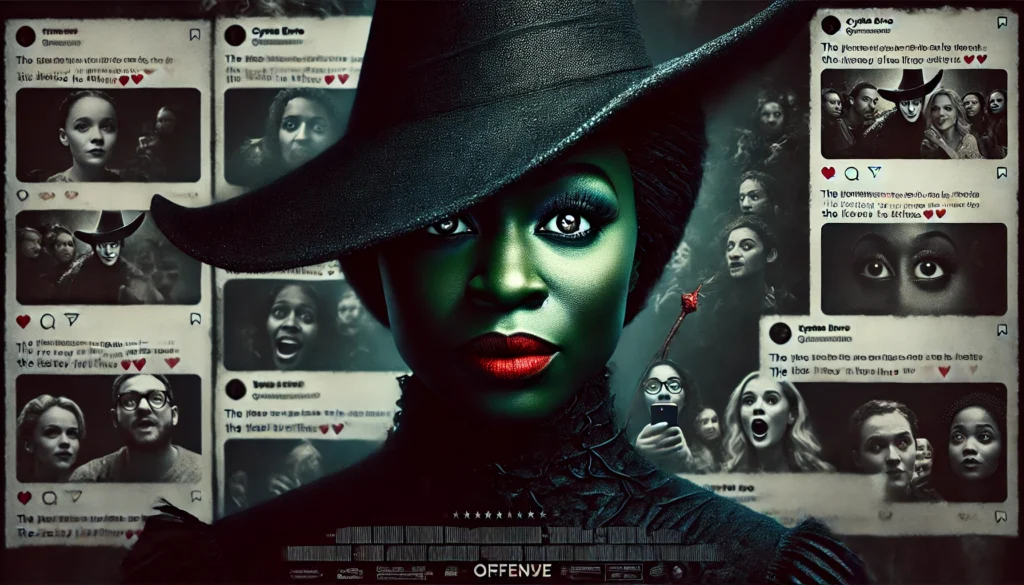
Cynthia Erivo Criticizes Fan Edits of Wicked Poster as “Wildly Offensive”
Cynthia Erivo, the acclaimed star of the upcoming Wicked movie adaptation, recently took to social media to express her frustration and hurt over fan-edited versions of the film’s official poster. Erivo, who plays Elphaba, the iconic Wicked Witch of the West, was upset by alterations made by fans to her image, particularly the edits that minimized her facial features. In these versions, fans covered her eyes with the brim of her witch hat and added bright red lipstick, dramatically changing her appearance. Erivo found these modifications not only offensive but deeply degrading.
In her social media post, Erivo emphasized that the original poster was carefully crafted to communicate a great deal of emotion and intensity through her eyes. By obscuring her face, particularly her eyes, Erivo felt that a crucial aspect of her character and her portrayal was lost. “My eyes are important to this portrayal,” Erivo explained, adding that the changes felt like a form of erasure, especially given the role her appearance plays in the story’s larger themes.
A Controversy Rooted in Race and Representation
What made this situation particularly troubling for Erivo was the context of Wicked itself, a story deeply rooted in themes of prejudice, othering, and discrimination. Erivo noted that by altering her appearance in such a drastic way, these edits unintentionally reinforced harmful stereotypes and raised important issues around race. As a Black actress portraying a character who already deals with societal rejection in the narrative, Erivo felt these edits touched on sensitive racial issues that resonate both in the film and in reality.
Erivo’s frustration is understandable given the long history of race-based discrimination in media representation. For her, the edits were not just a cosmetic change, but a reflection of deeper societal problems around race, visibility, and the portrayal of Black actors in major roles. In her post, Erivo stated, “We worked so hard to make sure this poster conveyed so much through just a look. To see my face altered and minimized like this—it feels personal. It feels like erasure.”
Fans and Social Media Reactions
In response to Erivo’s statements, fans and social media users have expressed a wide range of opinions. Many rallied behind Erivo, showing their support and condemning the edits. Some fans acknowledged how the changes could be seen as offensive, agreeing that the fan-made versions downplayed the significance of her portrayal and the broader themes of the film.
One supporter commented, “Cynthia is absolutely right. These edits undermine everything that Wicked stands for.” Another fan added, “It’s about more than just a poster. It’s about representation and respect for the actors involved.”
However, not all responses were sympathetic. A segment of the fanbase downplayed Erivo’s reaction, suggesting that the changes were minor and that her criticism was an overreaction. “It’s just a poster, and fans like to play around with visuals. There’s no need to take it so seriously,” one user remarked. This divide in opinion has sparked discussions on the responsibility of fan-created content and how it can impact the artists involved, especially when racial sensitivities are at play.
The Larger Impact on the Wicked Movie
This controversy surrounding the Wicked poster has sparked broader conversations about the role of fan culture, race, and artistic integrity. The Wicked movie, which also stars pop icon Ariana Grande as Glinda the Good Witch, is one of the most anticipated musical adaptations in recent years. The film, directed by Jon M. Chu, will be released in two parts, with the first installment scheduled to hit theaters in November 2024.
As excitement builds for the film’s release, this incident has highlighted how fan interactions with promotional materials can sometimes cause unintended harm. It also emphasizes the importance of considering racial and cultural contexts when making alterations to official content. Erivo’s candid response has ignited important conversations about race, representation, and respect in the entertainment industry.
Conclusion
Cynthia Erivo’s reaction to the fan-edited versions of the Wicked poster underscores the complex relationship between fan culture and the actors who portray beloved characters. Her criticism highlights how seemingly minor alterations can carry deeper implications, particularly around issues of race and representation. As the release of Wicked draws near, it remains clear that Erivo’s portrayal of Elphaba is more than just a role—it’s an opportunity to bring important themes of acceptance and visibility to the forefront of mainstream cinema.







Comments (1)